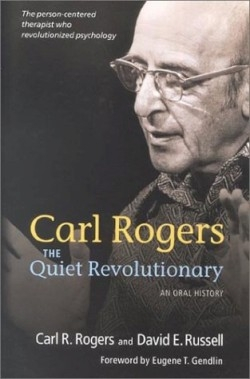Carl Rogers
The Quiet Revolutionary
The author learned empathic, active listening from a few people who listened well to him. Prior to attending the University of Wisconsin, he was a bookish introvert who felt “it was ridiculous to confide in anyone. They wouldn’t understand… If I tried to tell them they would understand even less.” In this refreshingly candid oral history done in 1986 (the year before he died), Rogers talks about himself, his family, teachers, colleagues, students, therapy, education, and conflict resolution, with asides about agriculture, science, religion, and sex.
One of the most influential psychologists of the past century, Rogers was practical, idealistic, and undogmatic to the end, as this conversational autobiography proves. A prolific and famous author (Client-Centered Therapy; On Becoming a Person; and books on encounter groups, marriage, and power), he was a pioneer of humanistic psychology, influenced by Otto Rank and Jessie Taft. Although criticized for being too simplistic or unscientific, Rogers used early recording technology in putting therapy under the microscope, and he blasts psychoanalysis as a complex theory that cannot stand up to objective testing. Convinced that a good theory is both simple and profound, Rogers came to accept that science often cannot explain causes, but can indicate what works-in child development, therapy, and government. Frustrated by the usual academic bureaucracy, he worked well in democratic groups, spanning several disciplines. That this posthumous book seems so timely testifies to the durability of his ideas and accomplishments. He speaks frankly-both proudly and humbly-about success and failure, friends and enemies, the family and the world, including peace in the Middle East and South Africa, and terrorism.
Rogers relates his encounters with many people of note-B. F. Skinner, Martin Buber, Richard Feynman, Paul Tillich, Virginia Axline-but feels that he was never part of the establishment, and hence his influence was limited. His revolutionary spirit comes through, a belief in empowering the individual and trusting the democratically functioning group. “It is very threatening to educational institutions to think that students can be trusted. What will become of faculty? … it does threaten anyone who holds power over people, and that applies to most individuals in places of influence.” This biography will have lasting importance in the social sciences and higher education in the United States.
Reviewed by
E. James Lieberman
Disclosure: This article is not an endorsement, but a review. The publisher of this book provided free copies of the book to have their book reviewed by a professional reviewer. No fee was paid by the publisher for this review. Foreword Reviews only recommends books that we love. Foreword Magazine, Inc. is disclosing this in accordance with the Federal Trade Commission’s 16 CFR, Part 255.

